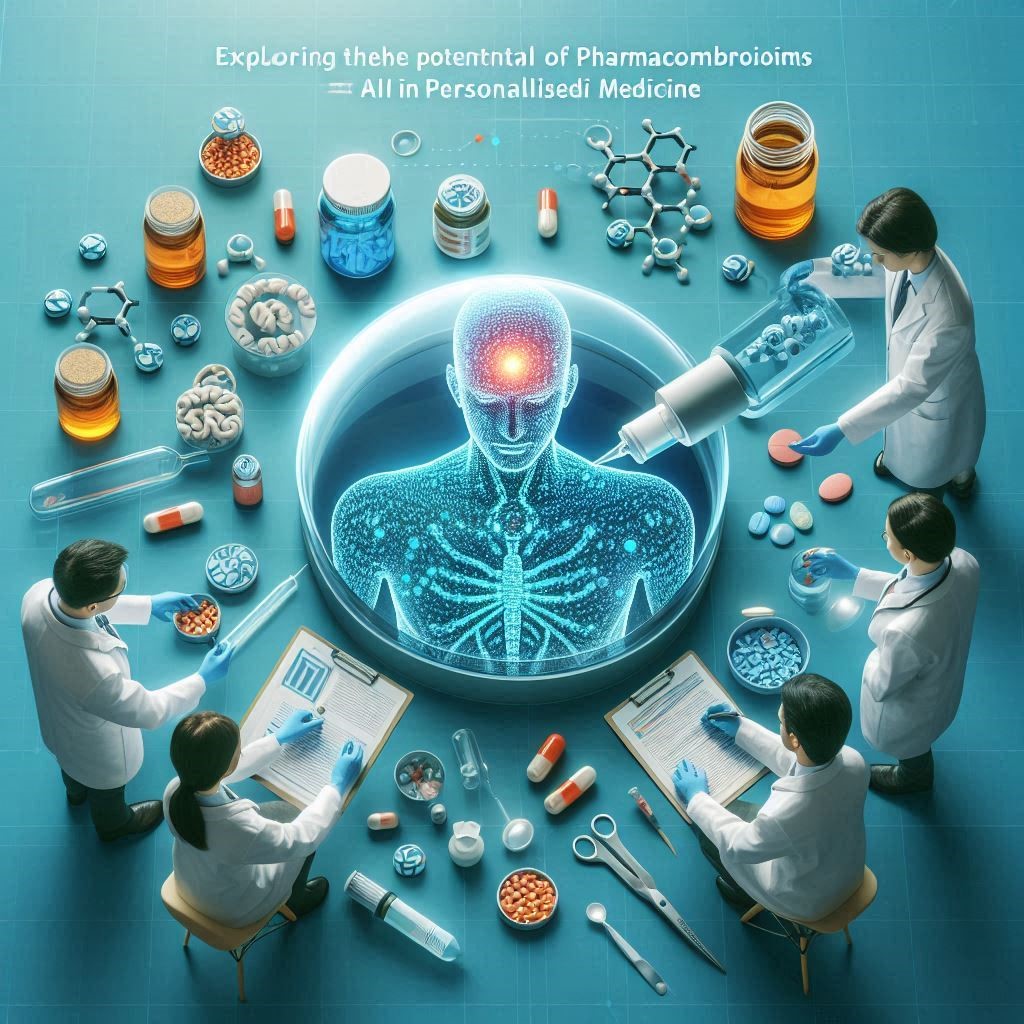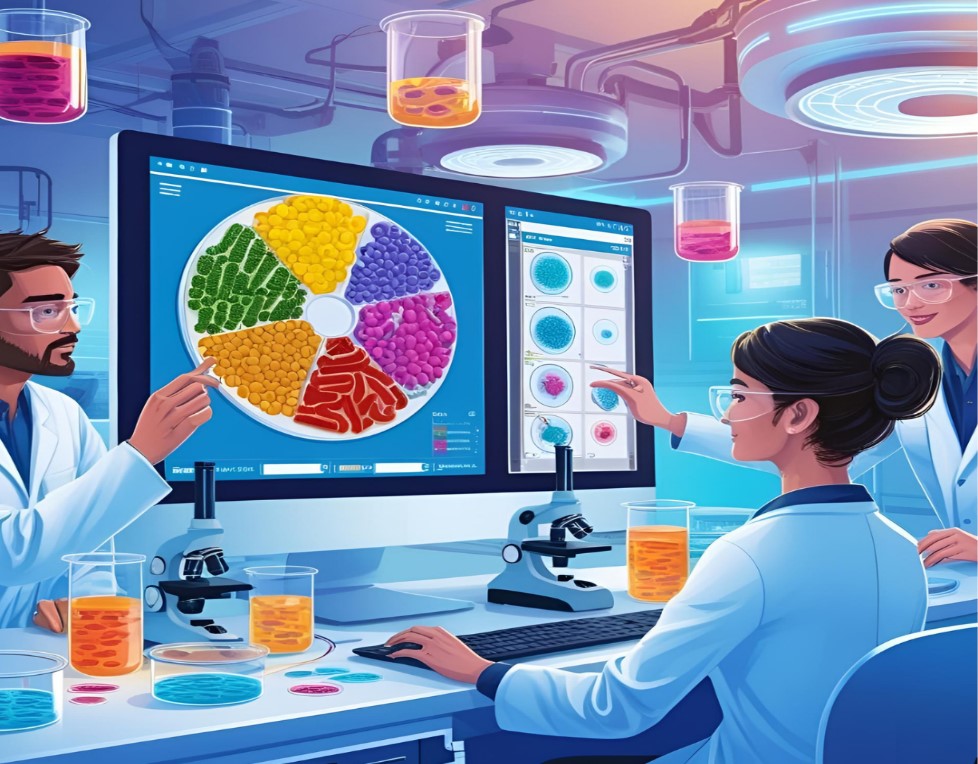Introduction
The field of pharmaceutical sciences is evolving beyond traditional drug development, with an increasing focus on personalized medicine. One of the most intriguing and emerging areas in this domain is pharmacomicrobiomics, which examines how the gut microbiome influences drug response and metabolism. With advancements in artificial intelligence (AI) and machine learning (ML), we are now able to decode complex microbial interactions, paving the way for AI-driven precision medicine. This paper explores the synergy between pharmacomicrobiomics and AI, highlighting their potential applications, challenges, and future directions in personalized medicine.

Figure 1: Illustrating AI implication on Pharmacomicrobiomics.
The Gut Microbiome: A Hidden Key to Drug Response
The human gut houses trillions of microorganisms, collectively known as the gut microbiome. These microbes play a vital role in digestion, immunity, and even mental health. However, recent research suggests that they also significantly influence drug metabolism, impacting both efficacy and toxicity. The interaction between gut microbes and pharmaceuticals can alter drug absorption, biotransformation, and elimination, making them critical factors in personalized medicine.
Microbial Influence on Drug Metabolism
Gut bacteria possess enzymatic pathways that can modify drug compounds in various ways:
- Activation of Prodrugs: Some medications require microbial enzymes for activation. For example, certain anticancer drugs depend on bacterial metabolism for their therapeutic effects.
- Deactivation of Drugs: Microbial metabolism can inactivate drugs, leading to therapeutic failure. An example is the bacterial degradation of digoxin, a heart medication, reducing its bioavailability.
- Toxic Metabolite Formation: Gut bacteria can convert drugs into toxic metabolites, contributing to adverse effects.
Understanding these microbial influences enables researchers to design drugs with improved bioavailability and reduced side effects.

Figure 2: A futuristic approach for analysing microbiome using machine learning AI based models
Key AI Applications in Pharmacomicrobiomics
AI-Driven Drug Response Prediction
- Machine learning models analyze gut microbiome profiles to predict individual drug metabolism.
- Personalized drug dosing can be achieved by integrating AI-based predictions with clinical data.
Microbiome-Based Biomarker Discovery
- AI can identify microbial biomarkers associated with drug efficacy, toxicity, or resistance.
- These biomarkers can guide treatment decisions, ensuring optimal therapeutic outcomes.
AI-Enhanced Probiotic Therapy
- AI models can simulate how probiotics interact with existing gut microbiota.
- This helps optimize probiotic formulations for adjunct therapy in conditions such as antibiotic-associated dysbiosis.
AI and Personalized Drug Development
With advancements in deep learning and AI-driven simulations, researchers are now exploring how an individual’s microbial profile can be leveraged for tailored drug therapies. This approach holds promise for improving drug safety and efficacy.
AI Innovations in Personalized Medicine
- Microbiome-Informed Drug Dosing
- Instead of a one-size-fits-all approach, AI-powered systems can suggest personalized drug doses based on gut microbial composition and metabolic activity.
- This minimizes adverse reactions and enhances drug efficacy.
- AI-Assisted Drug Discovery
- By analyzing vast microbiome datasets, AI can identify novel bacterial enzymes involved in drug metabolism.
- This information guides the design of pharmaceuticals with improved bioavailability and therapeutic potential.
- Microbiome-Driven Disease Prediction
- AI-powered diagnostic tools can detect disease-associated microbial patterns.
- This aids in early detection and prevention of conditions such as diabetes, cancer, and neurodegenerative disorders.
Challenges and Future Directions
Despite its promise, AI-driven pharmacomicrobiomics faces several challenges:
- Inter-Individual Variability
Each person’s gut microbiota is unique, making it difficult to create universal AI models. Variations in diet, genetics, and lifestyle influence microbial composition, adding complexity to predictive modeling.
- Data Privacy Concerns
AI-powered microbiome analysis requires large datasets, raising ethical concerns around data security and patient confidentiality. Ensuring compliance with regulations such as GDPR and HIPAA is crucial.
- Regulatory Frameworks
The integration of AI and microbiome data into clinical practice requires clear regulatory guidelines. Currently, regulatory frameworks for AI-driven pharmacomicrobiomics are still evolving, creating uncertainty in clinical implementation.
- Computational Complexity
The sheer volume of microbiome-drug interaction data demands powerful AI models with high interpretability and accuracy. Developing transparent AI algorithms that clinicians can trust remains a challenge.
Future Prospects
With continuous advancements in AI, metagenomics, and synthetic biology, pharmacomicrobiomics is poised to revolutionize personalized medicine and drug discovery. Potential future developments include:
• Real-time AI-driven microbiome monitoring for personalized treatment adjustments.
• Integration of AI-driven microbiome analytics with electronic health records (EHRs).
• Development of AI-powered digital therapeutics based on microbiome modulation.
Conclusion
The fusion of pharmacomicrobiomics and AI represents an exciting frontier in pharmaceutical sciences. By harnessing the power of gut microbes and AI-driven analytics, we can refine drug therapies, reduce adverse effects, and develop personalized treatments tailored to individual microbiomes. As AI continues to evolve, the future of pharmacotherapy will not only be dictated by genetics but also by the trillions of microbial cells and intelligent algorithms guiding drug development. Embracing this interdisciplinary approach will pave the way for a new era of precision medicine, enhancing healthcare outcomes worldwide
Source:
1. Clayton, T. A., Baker, D., Lindon, J. C., Everett, J. R., & Nicholson, J. K. (2009). Pharmacometabonomic identification of a significant host-microbiome metabolic interaction affecting human drug metabolism. Proceedings of the National Academy of Sciences, 106(34), 14728–14733. DOI: 10.1073/pnas.0904489106
2. Zimmermann, M., Zimmermann-Kogadeeva, M., Wegmann, R., & Goodman, A. L. (2019). Mapping human microbiome drug metabolism by gut bacteria and their genes. Nature, 570(7762), 462–467. DOI: 10.1038/s41586-019-1291-3
3. Quince, C., Walker, A. W., Simpson, J. T., Loman, N. J., & Segata, N. (2017). Shotgun metagenomics, from sampling to analysis. Nature Biotechnology, 35(9), 833–844. DOI: 10.1038/nbt.3935
4. Zeller, G., Tap, J., Voigt, A. Y., et al. (2014). Potential of fecal microbiota for early-stage detection of colorectal cancer. Molecular Systems Biology, 10(11), 766. DOI: 10.15252/msb.20145645
5. Beam, A. L., & Kohane, I. S. (2018). Big data and machine learning in health care. JAMA, 319(13), 1317–1318. DOI: 10.1001/jama.2017.18391
6. Topol, E. J. (2019). High-performance medicine: The convergence of human and artificial intelligence. Nature Medicine, 25(1), 44–56. DOI: 10.1038/s41591-018-0300-7
7. Khodadadi, L., Babu, G. R., & Beheshti, A. (2022). Artificial intelligence in precision medicine: Challenges and opportunities. Trends in Pharmacological Sciences, 43(5), 350–361. DOI: 10.1016/j.tips.2022.02.004
8. Shastri, T., Torres, A., & McHardy, A. C. (2021). Computational models for human microbiome dynamics and their applications in personalized medicine. Briefings in Bioinformatics, 22(6), bbab309. DOI: 10.1093/bib/bbab309
